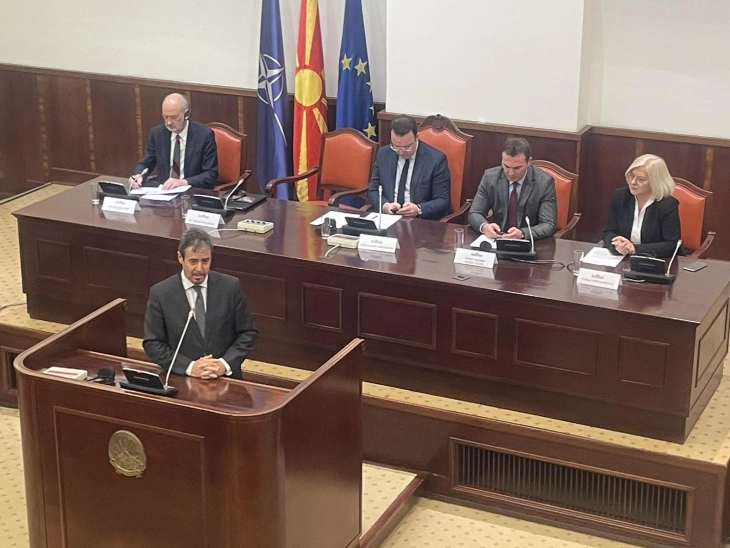Meurice: Enargement is EU's strategic interest; Belgium hopes to see progress during its presidency
- Protecting the rule of law, democracy and unity are the principles at the core of Europe and the European Union's values; these are the reasons that countries like North Macedonia want to join the EU, Belgian Ambassador Frédéric Meurice said while presenting the priorities for the Belgian presidency of the Council of the European Union from January to June 2024 at a joint session of the parliamentary Committee on European Affairs and the National European Integration Council on Friday.

Skopje, 9 February 2024 (MIA) — Protecting the rule of law, democracy and unity are the principles at the core of Europe and the European Union's values; these are the reasons that countries like North Macedonia want to join the EU, Belgian Ambassador Frédéric Meurice said while presenting the priorities for the Belgian presidency of the Council of the European Union from January to June 2024 at a joint session of the parliamentary Committee on European Affairs and the National European Integration Council on Friday.
The six-month presidency's motto is "Protect, Strengthen and Prepare," Ambassador Meurice said. Stressing the current international context, including the wars in Ukraine and Gaza, the energy crisis, and climate change, he said Belgium had six general priorities that would guide its presidency: defending rule of law, democracy, and unity; strengthening EU competitiveness; pursuing a green and just transition; reinforcing the EU social and health agenda; protecting people and borders; and promoting a global Europe.
"Enlargement is also a strategic interest of the EU and Belgium hopes that progress will be made in this area during our presidency," Ambassador Meurice said.
"We hope to hold an intergovernmental conference with North Macedonia and Albania," he said, adding that such a conference had been held with Montenegro a few weeks ago and the presidency was hoping to establish a negotiating framework with Moldova and Ukraine.
He said they would also work on improving the dialogue between Kosovo and Serbia as well as adjusting guidelines for the new Growth Plan for the Western Balkans.
"What we want to see is a Europe based on democracy and the rule of law," Meurice said. "To achieve this, we all have to take responsibility."
EU Ambassador David Geer said the European integration process was based on reforms. Progress was needed and achievable in the reforms of the judiciary, the rule of law, the fight against corruption, the public administration and human rights.
Ambassador Geer highlighted that constructive and inclusive dialogue between all political parties on key reforms was essential for success and an important prerequisite for moving forward. Among other things, he mentioned the required constitutional amendments, the adoption of amendments to the Electoral Code in accordance with the recommendations of OSCE/ODIHR, and the election of the State Election Commission's seventh member.
The current Parliament could have perhaps done more, perhaps there had been some frustrations, but there were also solid achievements, Geer said, adding that he hoped to continue the close cooperation with MPs after the people have had their say.

Parliamentary Committee on European Affairs chair Arbr Ademi said it was important that North Macedonia set up concrete instruments to fight corruption and not allow corrupt actors "set the rules of the game." He recalled that DUI had proposed a vetting law that would cover politicians, judges, prosecutors as well as the police and called on political parties to reach a consensus so the law could be voted in Parliament as soon as possible.
MP Gordana Siljanovska said reforms were difficult to achieve in an election year so people should set realistic expectations. At the same time, she asked whether Brussels would keep up its enthusiasm for enlargement in 2024 amid the growth of populist and undemocratic tendencies in the EU member-states. "The EU must not be held hostage by some of its members," Siljanovska said.
MP Snezhana Kalevska Vancheva said it was good that the Parliament would be evaluated during the country's European integration as an institution guaranteeing democratic processes. "We must admit we could have certainly done more and better. And we could have done it if we had worked together," Kalevska Vancheva said, adding that North Macedonia had shown it was ready to enter the European integration process.
National European Integration Council chair Aleksandar Nikoloski expressed his displeasure at the beginning of the session that another session had been scheduled in Parliament at the same time – an emergency plenary session on replacing caretaker government ministers – which he considered disrespectful to the National European Integration Council's work. He said this meant that the council's session would not be attended by the press or other MPs. He added that since he was in a hurry to attend the other session himself, he would not speak at the council's session. mr/







